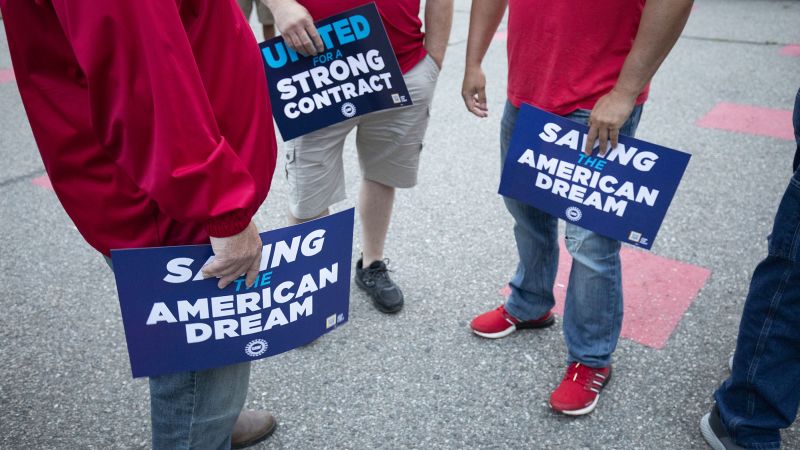United Auto Workers union President Shawn Fain said Thursday the union has filed an unfair labor practice complaint against General Motors and Stellantis, a new sign of how far apart the union and the automakers remain as they negotiate a new contract only two weeks before a strike deadline.
The complaint accuses the automakers of not bargaining in good faith by not providing any response to the union’s economic demands at the bargaining table.
“We are now 14 days out from our contract expiration and both General Motors and Stellantis have failed to give us any economic counters,” Fain said in prepared remarks obtained by CNN to members on Facebook and YouTube Thursday evening.
The complaint itself has almost no legal significance at this point because it will likely take weeks, if not months, for the National Labor Relations Board to act.
The claims are more of a negotiating tactic than a legal maneuver, said Todd Vachon, professor of labor studies at Rutgers University.
“It shows there’s definitely a lot of stress and tension between the two sides that there are unfair labor practice charges being filed at this point,” said Vachon. “It’s also a way to get members fired up.”
Fain acknowledged that the unfair labor practice is not nearly as significant a step by the union as its threat to strike.
“At the end of the day our strongest line of defense is each other and our abilility to take collective action,” he said.
Both GM and Stellantis, which makes vehicles under the Jeep, Ram, Dodge and Chrysler brands, deny the union’s charge that they are not bargaining in good faith.
“Stellantis has not received the filing, but is shocked by Mr. Fain’s claims,” said the company’s statement. “We are disappointed to learn that Mr. Fain is more focused on filing frivolous legal charges than on actual bargaining.”
Gerald Johnson, GM executive vice president of global manufacturing, said in a statement that GM was “surprised by and strongly refute the NLRB charge filed by the UAW.”
“We believe it has no merit and is an insult to the bargaining committees,” Johnson said. “We have been hyper-focused on negotiating directly and in good faith with the UAW and are making progress. The pace of negotiations is based on how quickly both parties resolve nearly 1,000 UAW demands, including more than 90 presented this week. Our goal remains the same – to achieve an agreement without a disruption.”
Fain said the automakers’ playbook in negotiations is “delay, delay, delay.”
“I still believe it’s possible to reach a deal before the deadline but only if both parties show up ready to bargain,” he said.
The UAW is on record with an ambitious set of bargaining demands, including raises of more than 40% over the four-year life of the next contract and the elimination of differences in pay and benefits between long-time employees hired before 2007, and those hired after.
Among those differences are a traditional defined benefit pension plan and retiree health care coverage that long-time employees currently have but that newer employees do not.
The union also objects to the even lower pay levels for workers who can remain stuck on temporary status for years. And it wants a return of the cost-of-living adjustment that raises pay an additional amount annually based on the rate of inflation.
Fain said that Ford is the only one of the three companies to respond to the union’s economic demands. That is why the union did not file an unfair labor practice against it. But he said the Ford offer was not sufficient, offering only a 9% raise in pay over the four-year life of the contract.
“Ford’s wage proposal not only fails to meet our needs, it insults our very worth,” he said.
Ford said its offer is better than how Fain characterized it in his remarks to members Thursday. It said that between raises in hourly wages and annual bonuses beyond any profit sharing payments, Ford’s UAW members would see guaranteed annual earnings increase by 15% over the life of the contract. It said it would pay workers far more than employees at the nonunion US auto plants operated by Tesla and foreign automakers.
“This would be an important deal for our workers, and it would allow for the continuation of Ford’s unique position as the most American automaker,” said Ford’s statement. “But we will not make a deal that endangers our ability to invest, grow and share profits with our employees. That would be harmful to everyone with a stake in Ford, including our valued UAW workers.”
The UAW’s contracts with GM, Stellantis and Ford all end at 11:59 pm on September 14, and the union has said it will not extend the contracts and stay on the job if tentative labor ageeements are not reached. There are 145,000 UAW members at the nation’s three unionized automakers. The rank-and-file members voted overwhelmingly to authorize a strike in a vote concluded August 24.
The UAW has never struck all three automakers at the same time. But UAW President Shawn Fain, who was elected earlier this year in the first popular election held to select the union’s leader, is raising the possibility this time, saying there will be no extensions granted to any of the automakers.
Read the full article here













Leave a Reply